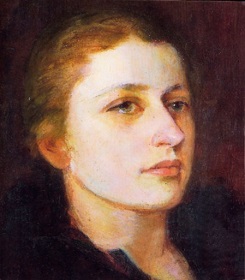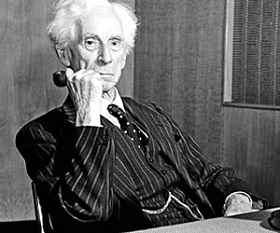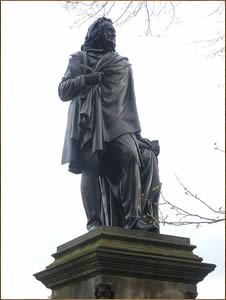|
De Perzische dichter Omar Khayyám, of zoals zijn arabische naam luidt, al-Imâm Abu Hafs 'Omar ebn Ebrâhim al-Khayyâmi, werd geboren op 18 mei 1048 te Nishapur. Zie ook alle tags voor Omar Khayyám op dit blog.
Kwatrijnen
Hij zelf trad gistren in dees aardsche kroeg,
Hij, de vervuller van wat ieder vroeg.
Hij sprak den beker langend: drink! ‘k zei: neen!
Drink! loech Hij, is mijn liefde niet genoeg?
Wat baat de wereld ons vertrek of komen?
Rest iets van wijsheids roem, of lof van vromen?
Wat blijft er staan van ‘t steil gebergt der hoop?
Stof, stof, slechts stof – stof uit stof voortgekomen.
Bestendig blijf in wisselvalligheid.
Wees niet bedrukt voor ‘t vlieden van den tijd.
In een paar dagen slijt ziels kleed tot lompen.
Wat geeft ‘t, of gij werkt, vecht, bezoedeld zijt?
Die, wars van ‘t goede, leeft van slechte streken,
Zich achter Gods gena driest durft versteken,
Hoop niet te zeker op zijn gunst, Hij zal
Nooit met één maat zondaars en zuivren reeknen.
Vertaald door Willem de Mérode

Omar Khayyam (18 mei 1048 - 4 december 1131)
Omar Khayyam en Saki
De Duitse dichter en schrijver Ernst Wiechert werd geboren op 18 mei 1887 in Kleinort bij Sensburg in Oostpruisen.(Tegenwoordig Polen). Zie ook alle tags voor Ernst Wiechert op dit blog.
Ihr seid der Pfeil
Ihr seid der Pfeil auf meinem dunklen Bogen,
der Glocke Erz auf meinen stillen Türmen,
ihr seid der Bote weit vor meinem Heere,
ihr seid der Wald vor meinen nächt'gen Stürmen.
Was ich noch frage, habt ihr schon gesprochen,
was ich noch suche, habt ihr schon gefunden,
was ich noch halte, habt ihr schon zerbrochen,
was ich noch binde, habt ihr schon entbunden.
In eurem Ohr braust das "Steh auf und wandle",
Jehovas Säule leuchtet eurem Wege,
indessen ich in der verlassnen Kammer
des Grabes Tücher still zusammenlege.
Mit dem „Betenden Knaben“
Er schweigt zu Gott aus einem tiefen Walde,
aus dem nur Rufe sanfter Tiere klangen,
und seine Hände sind wie eines Kindes
geöffnet, um das Wunder zu empfangen.
Um seine Lip'pen strahlt des Kindes Glaube,
daß Gott zu ihm im Sturm wird kommen müssen,
und um sein Knie bebtschon die leise Beugung,
mit der er stürzen wird zu seinen Füßen.
Von seinen Schultern fällt das Leid der Erde,
und wie ein Kind aus seiner kleinen Schale
hebt er die reifen Früchte zu der Kelter
des Weins zu unsrem großen Abendmahle ...
Du aber weißt, daß ich mich dir enthülle
und ganz in diesem Bild dein eigen bleibe,
und wie ein Kind zu jenem Gotte flehe,
der sich geoffenbart in deinem Leibe.

Ernst Wiechert (18 mei 1887 – 24 augustus 1950)
De Duitse schrijfster Franziska (gravin) zu Reventlow werd geboren op 18 mei 1871 in Husum. Zie ook alle tags voor Franziska zu Reventlow op dit blog.
Uit: Ellen Olestjerne
“Manchmal seufzte Marianne dann im stillen mit: die Mutter ließ sich und anderen wenig Ruhe, und ihre rastlose Lebhaftigkeit hatte beinahe etwas Aufreibendes – es war keine Kleinigkeit, ihr immer das Gleichgewicht zu halten, besonders, wenn sie sich in Taten umsetzte. Mochten nun die Dienstboten etwas versehen haben, die Jungen mit schlechten Zeugnissen heimkommen, oder die Kleinen irgendein Unheil anrichten – immer war es Marianne, bei der sie Zuflucht suchten, die alles ausgleichen und vermitteln sollte. So atmete sie meist erleichtert auf, wenn der stürmische Vormittag vorüber war und die Mutter sich nach Tisch mit einem Buch ins Wohnzimmer zurückzog. Für Marianne kamen dann die besten Stunden des Tages, wo sie dem Vater bei seinen Schreibereien half, oder ihn bei seinen Rundgängen auf dem Gut begleitete.
Auch die jüngeren Geschwister wußten diese häusliche Nachmittagsruhe nach Kräften zu genießen. Es war die Zeit, wo sie ungestört allen möglichen verbotenen Unternehmungen nachgehen konnten – den alten Gärtner drüben im Nebenhaus besuchen, wo sie Kaffee bekamen und an seinen langen Pfeifen rauchen durften, oder die Dorfkinder, die schon lange wartend am Gitter standen, hereinlassen und mit ihnen am Graben Brücken bauen und Schiffe schwimmen lassen. Das Kindermädchen hatte noch zu tun, und wenn Erik dabei war, ließ man die Kinder ruhig eine Zeitlang ohne Aufsicht. Ellen folgte dem älteren Bruder durch dick und dünn und zog den kleinen Detlev an der Hand hinter sich her. Mit vereinter Anstrengung bekamen sie ihn über alle Gitter und Schwierigkeiten weg, und wehe ihm, wenn er schrie oder sie verklagte.“

Franziska zu Reventlow (18 mei 1871 – 25 juli 1918)
Portret door Marie von Geysow, 1901 - 1902
De Britse filosoof, logicus, wiskundige en politiek activist Bertrand Arthur William Russell werd geboren in Trellech (Monmouthshire), Wales, op 18 mei 1872. Zie ook alle tags voor Bertrand Rusell op dit blog.
Uit: In Praise of Idleness
“First of all: what is work? Work is of two kinds: first, altering the position of matter at or near the earth's surface relatively to other such matter; second, telling other people to do so. The first kind is unpleasant and ill paid; the second is pleasant and highly paid. The second kind is capable of indefinite extension: there are not only those who give orders, but those who give advice as to what orders should be given. Usually two opposite kinds of advice are given simultaneously by two organized bodies of men; this is called politics. The skill required for this kind of work is not knowledge of the subjects as to which advice is given, but knowledge of the art of persuasive speaking and writing, i.e. of advertising.
Throughout Europe, though not in America, there is a third class of men, more respected than either of the classes of workers. There are men who, through ownership of land, are able to make others pay for the privilege of being allowed to exist and to work. These landowners are idle, and I might therefore be expected to praise them. Unfortunately, their idleness is only rendered possible by the industry of others; indeed their desire for comfortable idleness is historically the source of the whole gospel of work. The last thing they have ever wished is that others should follow their example.
From the beginning of civilization until the Industrial Revolution, a man could, as a rule, produce by hard work little more than was required for the subsistence of himself and his family, although his wife worked at least as hard as he did, and his children added their labor as soon as they were old enough to do so. The small surplus above bare necessaries was not left to those who produced it, but was appropriated by warriors and priests.”

Bertrand Russell (18 mei 1872 – 2 februari 1970)
De Schotse schrijver John Wilson werd geboren in Paisley op 18 mei 1785. Zie ook alle tags voor John Wilson op dit blog.
The Three Seasons of Love
With laughter swimming in thine eye,
That told youth's heartfelt revelry;
And motion changeful as the wing
Of swallow wakened by the spring;
With accents blithe as voice of May
Chanting glad Nature's roundelay;
Circled by joy like planet bright
That smiles 'mid wreathes of dewy light,—
Thy image such, in former time,
When thou, just entering on thy prime,
And woman's sense in thee combined
Gently with childhood's simplest mind,
First taught'st my sighing soul to move
With hope towards the heaven of love!
Now years have given my Mary's face
A thoughtful and a quiet grace:—
Though happy still,—yet chance distress
Hath left a pensive loveliness;
Fancy hath tamed her fairy gleams,
And thy heart broods o'er home-born dreams!
Thy smiles, slow-kindling now and mild,
Shower blessings on a darling child;
Thy motion slow, and soft thy tread,
As if round thy hushed infant's bed!
And when thou speak'st, thy melting tone,
That tells thy heart is all my own,
Sounds sweeter, from the lapse of years,
With the wife's love, the mother's fears!
By thy glad youth and tranquil prime
Assured, I smile at hoary time!
For thou art doomed in age to know
The calm that wisdom steals from woe;
The holy pride of high intent,
The glory of a life well-spent.
When, earth's affections nearly o'er,
With Peace behind, and Faith before,
Thou render'st up again to God,
Untarnished by its frail abode,
Thy lustrous soul,—then harp and hymn,
From bands of sister seraphim,
Asleep will lay thee, till thine eye
Open in Immortality.

John Wilson (18 mei 1785 - 3 april 1854)
Stabdbeeld in Edinburgh
18-05-2014 om 19:12
geschreven door Romenu 
Tags:Ernst Wiechert, Omar Khayyam, Franziska zu Reventlow, Bertrand Russell, John Wilson, Romenu
|

